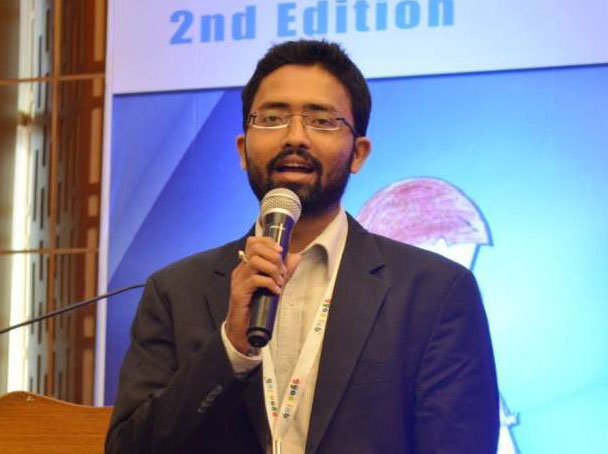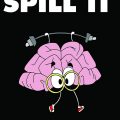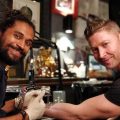
GyanLab plans to rope in one million students

A space for misfits, rebels, odd ones
Priyadeep Sinha, 28 years, started his entrepreneurship when he was in the final (4th) year of Mechanical Engineering from Manipal institute. Sinha stayed in Manipal for additional two years running his enterprise, GyanLab, from the University incubator. He finally moved to Bangalore in 2013 and has been living there ever since.
Here is his entrepreneurial journey as told to Baishali Mukherjee. Scroll down!
The genesis
We started GyanLab in Jan, 2011. Our focus was inculcating 21st century skills among K-10 students through our flagship program Kidovators. We have launched India’s first creative thinking olympiad – Kidovators Creativity Olympiad: The Erehwon Challenge. We also ran a platform for courses on creativity and other 21st century skills for students studying in grades four - nine. We started the Kidovators programs in 2013 prior to which we were setting up and running maker spaces in schools.
The trigger
It was the time when I was winning awards at multiple b-plan competitions in college. Around September 2010 we came up with GyanLab b-plan. We presented it during our university incubator’s b-plan competition. It ended up being one of the winning ideas and we were given a chance to start the company.
I think the motivation for the idea of GyanLab goes back to when I was in high school. I was considered to be a good student but gradually my interest in classroom studies kept diminishing as it did not let me enjoy learning. It did not allow me to express my thoughts freely.
By the time I was in Grade 11, I had completely lost my interest in school education. I had trouble in almost every subject and my class teacher even went on to tell my parents that my sense of going against the system will only make my life more miserable.
It was the same story during my undergraduate studies at Manipal. Ever since I was a kid, I loved technical drawings, breaking and rebuilding things. I felt that I was meant to study mechanical engineering. But, the actual course was outdated and practical exercises were limited. While I completely failed in the classroom, I found solace in research and writing new technical papers and business plans. I won a few awards for the same.
I then realized that I have my own way of learning, and so did many of my classmates and other students. Some of them thrived in the classroom, most did not. I had to do something to help students like me and my classmates find their footing in the world of learning. I felt that I must try creating alternate learning programs for school students and started GyanLab with two other co-founders. My former co-founders Sonali Gupta (2011-16) is currently in her 2nd year of MBA at IIM Bangalore and Abhash Kumar (2011-13) is currently head of marketing at Factordaily.
Road to success is a bumpy one
We initially started up with setting maker spaces in schools teaching students science, math, life-skills and robotics through hands-on activities. We felt that was the best way to tackle the learning stagnation in the curriculum and prepare students for a successful future, especially those who were struggling in the classroom.
We won a good number of accolades for this winning at the Power of Ideas 2012 (IIM Ahmedabad) and second place at Dell Education Challenges (Austin, USA). In the first year of the program, we just started with a few activities and one pilot school. The students were learning and they were getting better at it. We kept spending money on R&D simultaneously trying to grow the program.
Being a novice, I made many mistakes. The program was under-priced, was optional in most schools. However, many schools’ unwillingness to provide school’s faculty as trainers meant additional expenses placing trainers in each of these schools. Between 2012 and 13, I personally visited 700+ schools picking my bag, reaching the gates and trying to get meetings with the decision makers. In the end, we only managed to onboard 19 schools and about 5000 students. Essentially, it meant we earned Re 1 for every Rs 3 spent. Once the money ran out, I had no option but to scrap the program. I let go of the entire team of 19 and restarted.
Strategies are the key
It was after the initial failure that we took a leap of faith and started Kidovators. It was just Sonali and I in the team and the two of us took every cost cutting measure we could. It was also around this time that our advisors’ M Chandrasekaran and Luis Miranda along with my parents agreed to invest money in the company. It helped us get out of the mess and create pivot. It gave us the strength to continue on our journey. We also gave up our office space, ran the company from my home. Letting go of the entire team was the hardest bit. We tried to ensure right placement for every outgoing team member.
The best part was the effort we had put in reaching out to schools and students. We started understanding what to sell, how to sell and at what price to sell. We also had more insights into marketing, sales and product development. Also, all of this taught us great humility and I think it was necessary to give us the right perspectives on what are important things while running a startup and what doesn’t matter. This ensured that we were amazingly well prepared to launch and scale Kidovators looking back in hindsight.
Growth chart
We are just beginning with our growth. We are currently working with more than 90 schools in our Kidovators program. In the last 6.5 years, we have directly impacted the lives of 60,000 students across our present and past programs. I strongly believe that our growth will be driven by useful product and strong customer / consumer satisfaction. And, this is what we have been strengthening ever since we started Kidovators. We have never lost a school from our customer roster. We always take special care in solving every problem a school, an educator, a parent and a child bring to us, and we take pride in that. Also, we have a great group of parent evangelists and they would also aid massively in our growth in the subsequent years.
Future plans
Our plan is to bring about Rs 10 lakh or one million students under the scaffolding of the Kidovators 21st century skills programs optimistically in the next five years. We also have a robust pipeline of programs and goals regarding other 21st century skills that we will implement over the next five years.
Have you ever opted for digital alternate learning program for academic courses? Do share your experience.









